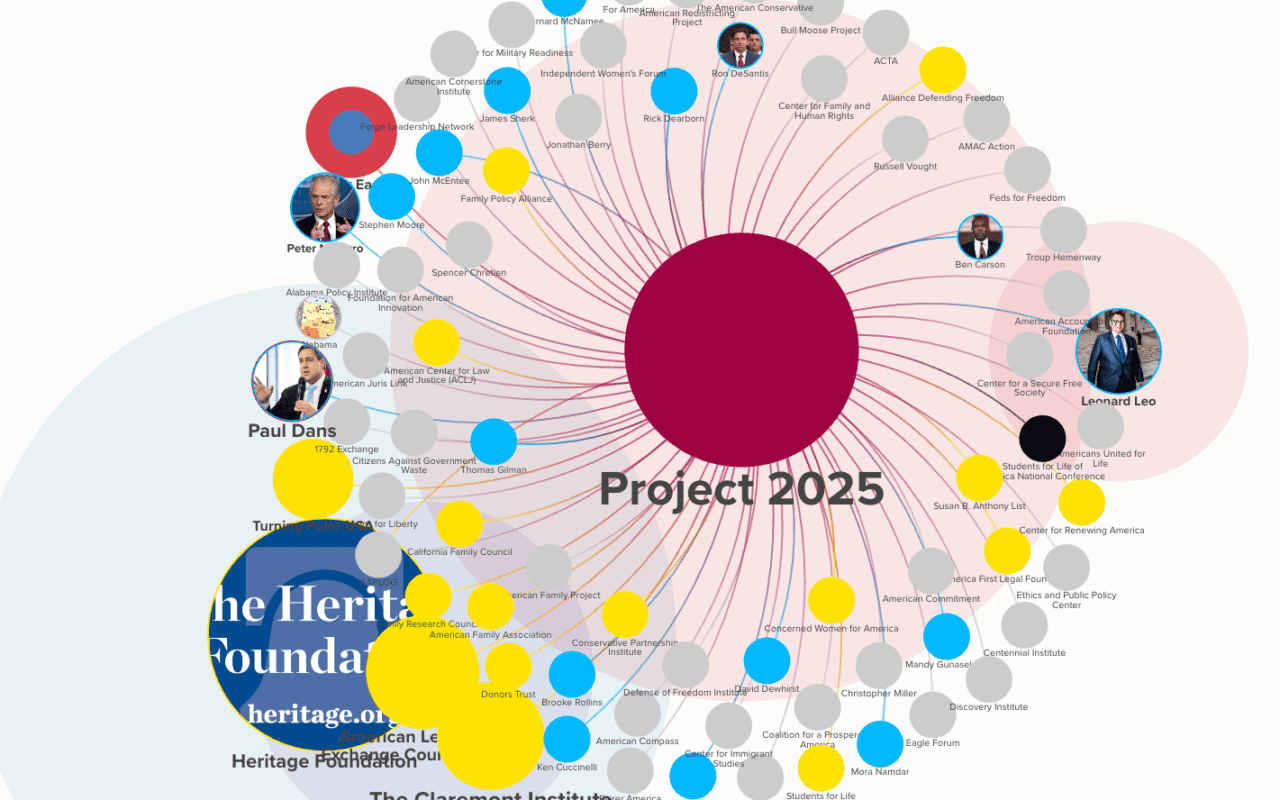Project 2025, led by former Trump official Paul Dans and key conservative figures within The Heritage Foundation, sets forth an ambitious conservative and Christian nationalist vision aimed at fundamentally transforming the role of the federal government. Leonard Leo, a prominent conservative known for his influence on the U.S. Supreme Court‘s composition, is among the project’s leading fundraisers.
The initiative seeks to undo over a century of progressive reforms, tracing back to the establishment of a federal administrative framework by Woodrow Wilson, through the New Deal by Roosevelt, to Johnson’s Great Society. It proposes a significant reduction in the federal workforce, which stands at about 2.25 million people.
Project 2025 plans
Essential measures include reducing funding for, or even abolishing, key agencies such as the Department of Justice, the FBI, the Department of Homeland Security, and the Departments of Education and Commerce. Additionally, Project 2025 intends to bring semi-independent agencies like the Federal Communications Commission under closer presidential control.
At its heart, Project 2025 aims to secure a durable conservative dominance within the federal government, aligning it closely with the principles of the MAGA movement and ensuring it operates under the direct oversight of the White House. The project is inspired by the “unitary executive theory” of the Constitution, which argues for sweeping presidential authority over the federal administrative apparatus — in direct contradiction with the delicate system of checks and balances architected by the Founders.
It is also inspired by religious fervor (and the cynical exploitation thereof) — and Project 2025 has brought together a pantheon of Christian nationalist organizations and groups to draft policy that could be implemented with alacrity, select potential appointees for the administration, build networks with GOP at the state and local levels — and with right-wing networks around the world.
Project 2025 goals
To realize their extremist, authoritarian goal, Dans is actively recruiting what he terms “conservative warriors” from legal and government networks, including bar associations and offices of state attorneys general. The aim is to embed these individuals in key legal roles throughout the government, thereby embedding the conservative vision deeply within the federal bureaucracy to shape policy and governance for the foreseeable future.
They’ve put together an almost 1000-page playbook that spells out in excruciating detail all of the unconscionable things they wish to do with their stolen power. In addition to rolling back civil rights and destroying the federal government, the Trump 2.0 administration would reverse actions to curb climate change and funnel trillions in tax cuts to their oil, real estate, and other industry buddies at the expense of the middle class — reversing historic gains in reducing inequality under the Biden administration.
Trump crony and white nationalism enthusiast Steve Bannon has promoted Project 2025 on his podcast, calling it the “blueprint” for Trump’s second term.

Project 2025’s ties to Viktor Orban
Project 25 has also drawn scrutiny for its ideological ties to Viktor Orban and his illiberal government in Hungary. Orban’s administration is known for its populist rhetoric, anti-immigration stance, and consolidation of power, often undermining democratic norms and institutions.
This alignment reflects in Project 2025’s agenda, which advocates for a strong executive branch, curtailed regulatory oversight, and a rollback of progressive policies. Critics argue that such parallels underscore a growing transnational network of right-wing populism, where Orban’s model serves as a blueprint for similar movements in the U.S., aiming to reshape governance in ways that challenge liberal democratic principles.
The Danube Institute, a conservative think tank based in Budapest, plays a crucial role in fostering ideological connections between Viktor Orban’s government in Hungary and conservative movements abroad, including Project 2025 in the United States. Founded in 2013, the institute promotes Orban’s vision of “illiberal democracy,” advocating for national sovereignty, traditional values (code for “white Christian patriarchy”), and skepticism of supranational entities like the European Union. Funded by Orban’s government, the Danube Institute functions as a state mouthpiece, amplifying and legitimizing the administration’s perspectives on an international stage.
Project 2025 leaders and backers
- Paul Dans — A senior figure in conservative policy circles, known for his work on economic policies and regulatory reforms. He has been associated with several think tanks and policy initiatives aimed at shaping future conservative agendas in the United States.
- Leonard Leo — A prominent conservative legal activist, best known for his influential role in the Federalist Society, where he has been instrumental in the nomination process for conservative judges to the federal judiciary, including the Supreme Court.
- Charles Koch — Billionaire industrialist and political donor who co-owns Koch Industries, one of the largest private companies in America. He is widely recognized for his significant financial contributions to libertarian and conservative causes, including massively well-funded astroturfing and disinformation operations, focusing on free-market ideology and radically limited government. He has funded a number of the Project 2025 Advisory Board organizations.
- Stephen Miller — Senior advisor for policy (and resident ghoul) to former President Donald Trump, known for his hardline stance on immigration policy. Miller has been a vocal proponent of restrictive immigration measures and played a key role in shaping the administration’s immigration policies.
- Stephen Moore — An economic commentator and a former member of the Wall Street Journal’s editorial board. He co-founded the Club for Growth and has been a strong advocate for free-market economic policies, tax cuts, and the kind of business deregulation that allows markets to crash with the middle class holding the bag and the billionaire class getting bailed out.
- William L Walton — A conservative businessman and media personality who has been actively involved in various conservative organizations and initiatives. He is known for his efforts to promote conservative economic policies and values through media and philanthropy.
- David R Burton — A senior fellow in economic policy at The Heritage Foundation conservative think tank, where he focuses on tax matters, securities law, entitlements, and regulatory issues. Burton is known for his influence in financial and economic policy, advocating for policies that promote growth and innovation.
- Jonathan Berry — Berry is known for his work in labor and employment law, having served in prominent positions within the federal government, where he focused on regulatory reform and labor policies. He has been influential in shaping policies that aim to boost economic growth with less regard for worker rights.
- Kevin Roberts — The Heritage Foundation’s President, who famously said recently, whilst crowing about the anti-democratic SCOTUS ruling granting Trump immunity: “We are in the process of the second American revolution, which will remain bloodless, if the left allows it to be.”
- John McEntee — John McEntee is a political operative known for his role as a senior advisor at Project 2025. McEntee previously served as the Director of the White House Presidential Personnel Office under President Donald Trump, where he was instrumental in overseeing the hiring and firing of key administration officials. His tenure was marked by efforts to ensure loyalty to Trump’s agenda, earning him a reputation as a staunch ally of the former president. Prior to his political career, McEntee gained public attention as a personal aide to Trump — he earned the nickname “bag man” for literally carrying his bags — and through his work as a sports media personality.
- Bernard McNamee — Former Federal Energy Regulatory Commission head who wrote the Department of Energy chapter in Project 2025’s policy book, calling for the elimination of 3 agency offices and reduction of funding to other related to renewable energy.
- Mandy Gunasekara — Former Trump EPA chief who wrote the chapter dedicated to the Environmental Protection Agency.
- Max Primorac — Heritage research fellow and former chief operating officer of USAID for the Trump administration, who wrote the chapter on the US Agency for International Development.
Project 2025 Advisory Board organizations
Over 100 (so-called) conservative organizations have joined the planning of the project and are listed on their website so far:
- 1792 Exchange
- American Accountability Foundation
- AAPLOG
- Alabama Policy Institute
- Alliance Defending Freedom
- ACLJ Action
- American Commitment
- American Compass
- American Cornerstone Institute
- The American Conservative
- American Council of Trustees and Alumni (ACTA)
- American Family Association
- America First Legal
- American Juris Link
- American Legislative Exchange Council (ALEC)
- American Main Street Initiative
- American Moment
- American Principles Project
- American Family Project
- American Redistricting Project
- Americans United for Life
- AMAC Action
- Bull Moose Project
- California Family Council
- Centennial Institute at Colorado Christian University
- CEO USA
- Center for Family and Human Rights
- Center for Immigration Studies
- Center for Military Readiness
- Center for Renewing America
- Center for a Secure Free Society
- Citizens Against Government Waste
- The Claremont Institute
- Coalition for a Prosperous America
- Concerned Women for America
- Conservative Partnership Institute
- Defense of Freedom Institute
- Discovery Institute
- Eagle Forum
- Ethics and Public Policy Center
- Fairer America
- Family Policy Alliance
- Family Research Council
- Feds for Freedom
- First Liberty
- For America
- Forge Leadership Network
- Foundation for American Innovation
- Foundation for Defense of Democracies
- Foundation for Government Accountability
- Freedom’s Journal Institute
- The Frederick Douglas Foundation
- Calvert Task Group
- The Heartland Institute
- The Heritage Foundation
- MacArthur Society of West Point Graduates
- Hillsdale College
- Honest Elections Project
- Independent Women’s Forum
- Institute for Education Reform
- Institute for Energy Research
- Institute for the American Worker
- The Institute for Women’s Health
- Intercollegiate Studies Institute
- Dr. James Dobson
- The James Madison Institute
- Job Creators Network
- Keystone Policy
- Leadership Institute
- League of American Workers
- Liberty University
- Mackinac Center for Public Policy
- The MAlone Institute
- Middle East Forum
- Media Research Center
- Mississippi Center for Public Policy
- Moms for Liberty
- Mountain States Policy Center
- National Association of Scholars
- National Center for Public Policy Research
- National Right to Work Legal Defense Foundation
- Native Americans for Sovereignty and Preservation
- Noah Webster Educational Foundation
- Oklahoma Council of Public Affairs
- Project 21: Black Leadership Network
- Pacific Research Institute
- The Palm Beach Freedom Institute
- Palmetto Promise
- Patrick Henry College
- The Patriot Foundation Trust
- Personnel Policy Operations
- Public Interest Legal Foundation
- Protect Our Kids
- Recovery for America Now Foundation
- Republicans Overseas Foundation
- SAVE
- STARRS
- Students for Life of America
- Susan B. Anthony Pro-Life America
- Tea Party Patriots
- Texas Public Policy Foundation
- Teneo Network
- Turning Point USA
- Young America’s Foundation
Watch this space
We’ll be covering the movements and spinoffs of Project 2025 as we get closer to the general election. Perhaps it will be helpful to have their ideas and plans dragged out in the light, where suburban moms and other members of the reality-based community can see them in their full glory and understand the kind of scary power these guys (and they are mostly guys) would wield.
Stay tuned.

Comments are closed.